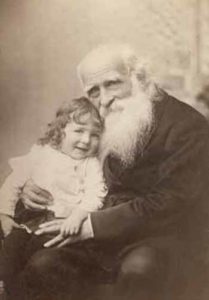
Theodore D. Weld
*Theodore Weld was born on this date in 1803. He was a white-American writer, editor, speaker, and organizer. He was an early architect of the American abolitionist movement during its formative years from 1830 through 1844.
Born in Hampton, Connecticut, Theodore Dwight Weld was the son of Congregational ministers Ludovicus Weld and Elizabeth Clark Weld. His brother, Ezra Greenleaf Weld, was a daguerreotype photographer involved with the abolitionist movement. A member of the Weld Family of New England, at age 14, Weld took over his father's 100-acre farm near Hartford, Connecticut, to earn money. He wanted to study at Phillips Academy, attending from 1820 to 1822, when failing eyesight caused him to leave.
After a doctor urged him to travel, he started an itinerant lecture series on mnemonics. He traveled throughout the United States for three years, including the South, where he saw slavery first-hand. 1825, Weld moved with his family to Pompey, in upstate New York. Weld then studied at Hamilton College in Clinton, New York. He decided to become a preacher, and in 1827, entered the Oneida Institute of Science and Industry after first staying at the farmhouse of founder George Washington Gale, working in exchange for instruction. While at the Oneida Institute, he would spend two weeks traveling about lecturing on the virtues of manual labor, temperance, and moral reform.
Weld left his studies in 1834 to become an agent for the American Anti-Slavery Society, recruiting and training people to work for the cause, making converts of James G. Birney, Harriet Beecher Stowe, and Henry Ward Beecher. Weld became one of the leaders of the antislavery movement, working with the Tappan brothers, New York philanthropists James G. Birney and Gamaliel Bailey, and the Grimké sisters. In 1836, Weld discontinued lecturing when he lost his voice and was appointed editor of its books and pamphlets by the American Anti-Slavery Society. In 1836, he worked as the editor of The Emancipator.
In 1838, Weld married Angelina Grimké, an abolitionist and women's rights advocate; at the marriage, there were two ministers, one white and one black. Two former slaves of the Grimkés' father were among the guests. He renounced any power or legal authority over his wife other than that produced by love. He then retired to a farm in Belleville, New Jersey, where he, his wife, and her sister co-wrote the very influential 1839 authoritative compendium American Slavery As It Is: Testimony of a Thousand Witnesses, published in 1839. Harriet Beecher Stowe partly based Uncle Tom's Cabin on Weld's text and is regarded as second only to that work in its influence on the antislavery movement.
In 1841, Weld relocated to Washington, D.C., to campaign for sending antislavery petitions to Congress. He assisted John Quincy Adams when Congress tried him for reading petitions violating the gag rule, which stated that slavery could not be discussed in Congress. Having demonstrated the value of an antislavery lobby in Washington, Weld returned to private life, where he and his wife spent the remainder of their lives directing schools and teaching in New Jersey and Massachusetts. In 1854, Weld established a school in Perth Amboy, New Jersey.
The school accepted students of all races and sexes. In 1864, he moved to Hyde Park, Massachusetts, where he helped open another school dedicated to the same principles in Lexington, Massachusetts. Weld remained dedicated to the abolitionist movement until the Thirteenth Amendment ended slavery to the United States Constitution in 1865. Theodore Weld died in Hyde Park, Massachusetts, on February 3, 1895.